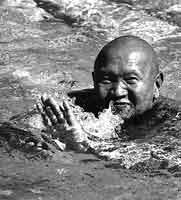|
|
||||
|
Millions are still deprived of the right to clean water |
||||
|
by T.Y.S. Gangchen Water, more precious than gold or even oil. The one element without which there is no chance of life. Nothing new of course in this statement, but at long last the issue has come off the ‘backburner’ and is making headline news, since the United Nations meeting in the Hague last March, which brought together experts, scientists and politicians from around the world who, in a collective voice, underlined the fact that the world today leaves billions of people without water. For example in Africa, where in the depth of its womb, Mother Earth would be rich in water resources, that which is missing is therefore not water, but the will to make financial investments in order for water to become available to all. In the meantime, in third world countries still far too many people are without access to drinking water and have no adequate sanitation or running water in their homes. On another level, it can be said that sadly things are not much better in western countries where this naturally available element, indispensable to life, has become an object of monopoly by governments and is, in some countries, financially run by private companies. Water has taken on the role of «the gold of the third millennium»: its use traces a clear separation between poor and rich, between developed and under developed, between clean and dirty... In the west, with showers and baths, washing machines and dishwashers, sanitation and gardens to hose, we take the privilege of consuming some 300 litres of water a day per person. Whereas in poor countries, like in Tibet for example, at this very moment there are thousands of men, women, elderly and children who are forced to walk miles to bring a tiny amount of water to their home; water which comes from dubiously hygienic wells and which therefore contributes to the spreading of sicknesses and infections. This water to them is so precious that they cannot even use it to wash themselves or to clean their clothes and the environment, and even less to irrigate their fields. According to dharma, the spiritual tradition which takes its roots in the teachings given by Buddha Shakyamuni 2,500 years ago, water is a very important and essential element. If we consider that the human body is mainly made up of water (about 75%), and that even the planet has more water than earth (in the form of lakes, seas, oceans, rivers and geysers), and that since centuries teachings have been passed down on how to respect, purify, strengthen an element so important to life, we too can clearly appreciate the vital role of water for life. We can learn how to meditate upon the Tibetan letter Bam, which represents the water element, both on the macrocosm and microcosm levels, and invoke the great water mother Lochana - a Buddhist female divinity, white in colour - and her spheric mandala, to request her help in healing and transforming the impure water element of our internal and external environment. Through concentrative meditation, we definitely develop more awareness and learn to better use our planet’s water resources so that all living beings may drink pure water and so that animals and all other forms of life may be free from the danger of extinction. According to traditional Tibetan medicine, the water element corresponds to the heart chakra, as well as relating to the kidneys, bladder, ears and hearing sense. It is the water element which is responsible for the circulation of body fluids, such as the blood stream, lymphatic system, and so forth. By making heartfelt requests to the great water mother, it is possible to passify all immune system disturbances, any allergies and cold natured related illnesses, as well as any astrological problems and negative interferences deriving from the influences of Mars and Mercury. On the environmental level, by invoking the great water mother, excessive monsoons, acid rainfalls, floods, storms and the excessive rise in sea levels can all be appeased. Aside from meditating to purify the water element present in the body and the environment, we can and must commit ourselves to doing something on a concrete and material level, in syntony with the teachings of the ‘awakened one’, that is Buddha Shakyamuni. This is of course also true according to the teachings of Jesus Christ who said «give water to those who thirst». For this reason, the Lama Gangchen World Peace Foundation’s commitment to bringing water in a poor and and all but forgotten part of the world, such as the place in Tibet where I was born, near Shigatse, is something to follow with full determination and a sincere sense of achievement. |
||||
|
|
||||


